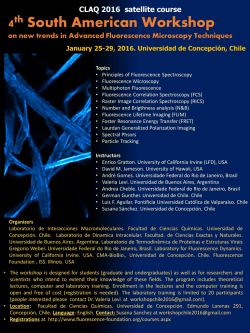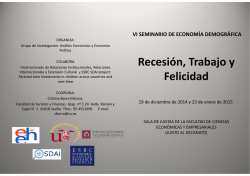
Call for Sub-Theme Proposals LAEMOS 2016(1)
6 th Photo: Minga* to move a house in Chiloé, Chile LATIN AMERICAN AND EUROPEAN MEETING ON ORGANIZATION STUDIES Viña del Mar - Chile 6 - 9 April 2016 Call for Sub-Theme Proposals * A minga is a pre-Columbian tradition of communitarian or voluntary collective work carried out with social usefulness or reciprocal intentions. It is current in many Latin American countries. A characteristic example of a minga in Chile is found in Chiloé, where the available workforce for agricultural jobs is reduced to the members of each family. There, they perform “tiraduras de casa” in which houses are moved in order for them to be closer to a road or given the acquisition of a new land. Subverting organizations: Reflecting on aims, meanings and modalities of organizing Understanding the aims, meanings and modalities of organizing constitutes a key part of organization studies. In recent years, organizational scholars have increasingly addressed these issues by exploring several intersections among organizations, movements and markets. Such endeavours into unconventional settings and often viewed through new lenses are likely to come as a challenge to dominant concepts and categories traditionally used to explain organizational phenomena, such as productivity, efficiency and competitiveness. For example, social movements and alternative organizations in Latin American and Europe promote visions, means and ends for organizations based on the principles of collaboration, participation, community and horizontality. These principles stand in sharp contrast to some of the core values of corporate capitalism, including the dominance of bureaucratic and hierarchical forms of organizing. Under these circumstances, organizations and organizational scholars need to develop alternative ways of making sense of (for example) organizational practices, sources of legitimacy and communication with various constituencies. A good example of such alternative forms of organizing is the “minga”. The word comes from the quechua word “mink’a” which means a collective job done in favour of the community. It finds its origins in a preColumbian tradition of voluntary communitarian activities, aimed to provide a reciprocal social benefit and is a practice still current in many Latin American countries. An example of a minga in Chile is the Chilota tradition of “tiradura de casa” in which a house is moved from one place to the new grounds where a family is going to live. The house is tied to oxen, tractors or boats in order to move it. In Chiloé island, where small properties and mini lands with little capital are predominant, the available workforce is reduced to the family and friends. This is what makes the minga an example of both collaboration and mutual benefit. As a deeply-rooted tradition in many countries in Latin America, the minga compels us to look critically at prevailing organizational logics that emphasize competition and individualism and to examine and analyze practices that, instead, privilege community well-being and reciprocity. These practices underpinned by values of collaboration and sustainability -amongst others- might be understood as the “resources” for new forms of organizing. Latin America and Europe, as different geopolitical contexts, both offer diverse examples of alternative organizational arrangements and processes, such as worker-controlled factories, occupy movements, co-operativism, popular education, fair trade, co-working endeavours, B-Corps and other practices that emphasize the mutual benefits of diverse communities. The purpose of the 6th LAEMOS Colloquium is to share empirical and theoretical research on the multiplicity of logics that shape current forms of organizing in and beyond Latin American and European societies. We invite Latin American, European and other organizational scholars to our minga, to connect voices, experiences and projects from different empirical, theoretical and methodological perspectives. Sub-theme proposals may connect with (but are not limited to) some of the following prospective topics: - Discussing the meanings of the organization, beyond productivity, efficiency and economic benefits - Production, recognition or invisibility of subjectivities in the organization - The power of organization and the organization of power: hierarchy, democracy and participation - The inside-outside of organizations: community, sustainability and environment - Why here? Spaces and territories of organizations - In ‘other’ wor(l)ds? Decolonizing organizations - Organizing through collaboration and collaborate for organizing - Higher and business educational challenge: beyond a course of ethics Deadlines Sub-theme proposals: June 10, 2015 Abstract submission (1.000 words): November 10, 2015 Notification of acceptance: December 10, 2015 Submission of full paper (6.000 words): March 10, 2016 Sub-theme proposals of about 500 words should be sent to [email protected]. The proposals should be in English, including a cover page with the sub-theme’s title and the names, affiliations and email addresses of the convening team. They should delimit a suggested domain and provide brief bios of the convenors. We encourage teams to involve scholars from different institutions and continents, as well as at different stages of their academic career. An international academic committee will evaluate all proposals. Organizing team Local scientific committee Marcela Mandiola School of Economy and Business - Universidad Alberto Hurtado [email protected] Alvaro Espejo School of Business - Universidad Adolfo Ibáñez [email protected] Gregorio Pérez Department of Management - Universidad de Santiago de Chile [email protected] Juan Pablo Toro Department of Psychology - Universidad Diego Portales [email protected] Paula Ascorra School of Psychology - Pontificia Universidad Católica de Valparaíso [email protected] International advisory committee David Courpasson EMLYON Business School [email protected] Saulo Dubard EMLYON Business School [email protected] Alex Faria EBAPE - Fundação Getulio Vargas [email protected] Ignasi Martí EMLYON Business School [email protected] Gerardo Patriotta University of Nottingham [email protected] Steven Poelmans EADA Business School [email protected] Camilo Pulido Facultad de Psicología - Pontificia Universidad Javeriana [email protected] Jenny K. Rodríguez Newcastle University Business School [email protected] Silviya Svejenova Copenhagen Business School [email protected] Diego Szlechter CONICET - Universidad Nacional General Sarmiento [email protected] LAEMOS conference administrator Sophia Tzagaraki Organization Studies [email protected] Local conference coordinator Nicolás Ríos [email protected] Venue Adolfo Ibáñez University (UAI) - Campus Viña del Mar The UAI Campus is located in the city of Viña del Mar (120 km. Northwest of Santiago de Chile, next to Valparaíso city), specifically up the hill at Altos del Sporting, with a great view to the Pacific Ocean and the city. The campus was designed by José Cruz, winner of the National Architecture Prize in 2012. UAI Campus Website: http://www.uai.cl/la-universidad/campus/campus-vina-del-mar Viña del Mar City Website: http://www.vinadelmar.cl Valparaíso City Website: http://www.ciudaddevalparaiso.cl Street View: Click here Host Institutions “From everywhere the seed skips, every idea is exotic, every day we wait for immense changes. We live enthusiastically the mutation of the human order.” Pablo Neruda (1904-1973) - Chilean poet and Nobel laureate for literature www.laemos.com
© Copyright 2026

